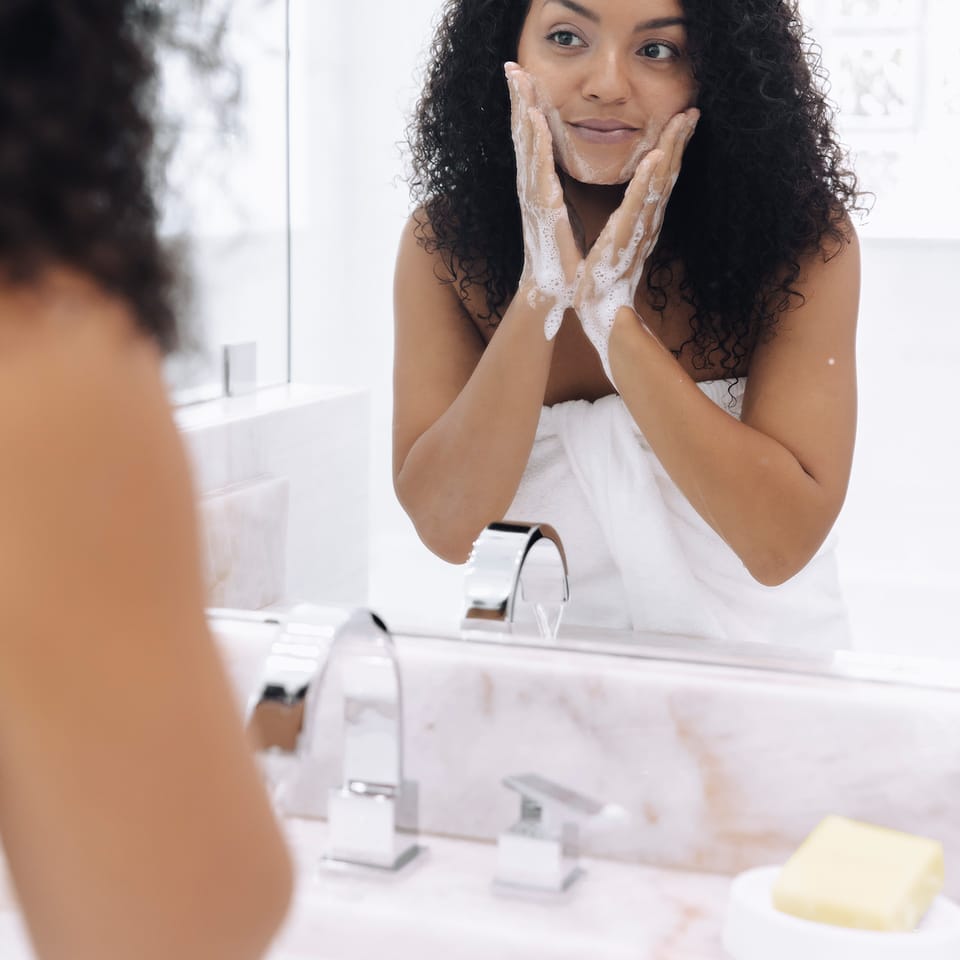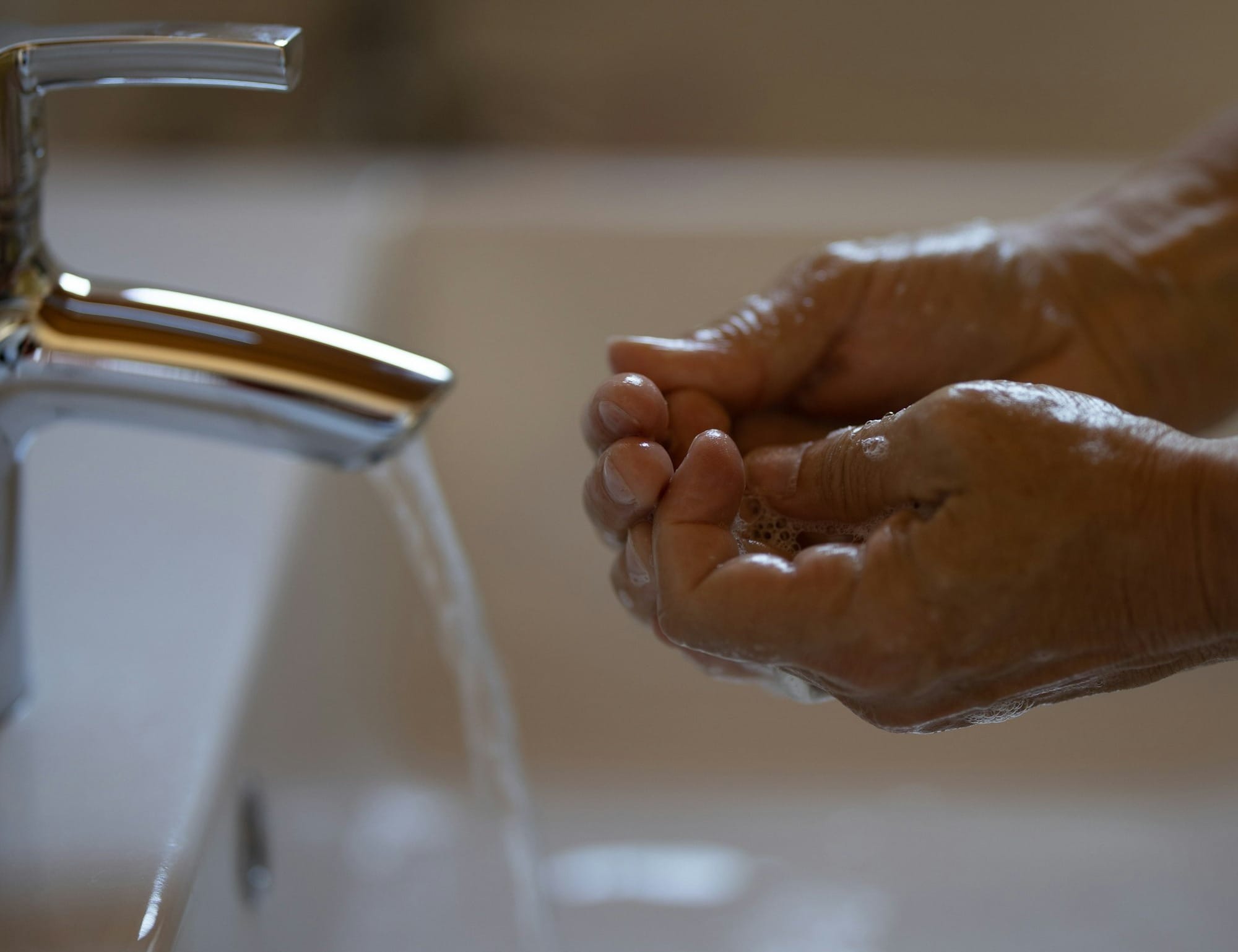Three Common Face-Washing Myths

Washing our face sounds fundamental and common sense but, funny enough, I did it wrong for years.
Like our hands, our faces are exposed to many environmental factors: dirt, natural oils, sweat, the germs people spread, and the pollutants in the air, water, or that we come into contact with, especially when we touch them and then touch our faces. Many of these factors lead to acne, illness, and dull, tired-looking skin.
I was well into my 30's when the benefits of a clean face began sinking in (no pun intended). Prior to this point, I had zero skincare routine, and was weighing my options about whether or not I wanted to continue a search for one when everything irritated my skin. Yet my skin had started to show the evidence of my neglect - hence my search.
I had never heard about the skin's microbiome, its reflection of our internal health, and its protective benefits. Even though I'd been in the fitness industry for a decade or so, none of the journals I read discussed maintaining the skin's natural oils and barrier. I was completely lost.
It was only when I jumped into the clean beauty sphere and started digging deeper into this passion project that I realized what I had been doing wrong when it came to the fundamentals of taking care of my skin.

Here are three myths I believed when it came to having a clean, healthy, glowing face:
Myth #1: My face did not need to be washed every day.
My first mistake was believing that washing my face each night before bed did not matter.
It does.
All that stuff our skin gets exposed to each day doesn't go away once we're done with our day. In fact, it starts settling in. Into our pores, fine lines, scarring, hairline, and pillows. Yes, it rests on our pillows too.
It's important to get rid of that dead skin, dirt, and other environmental toxins that have built up throughout the day in order to avoid skin irritations, inflammation, and breakouts. (Indeed, it is a good idea to wash in the morning as well for the same reasons, especially for those who have oily or combination skin. But honestly, have we ever considered those dust mites living in our mattress and pillows?)
Washing each night, at minimum, helps reduce the spread of these contaminants and decreases the chances of acne, dullness, and stressed-out skin. As importantly, it leaves our skin feeling rejuvenated.
But wait! There's more to washing.

Myth #2: Water + soap is all that matters.
Yes, let's recognize that these are two important parts to getting a clean face. However, there is a lot more to this thought. Let's first dig into the part that gets our cleanser to work in the first place – water.
Many years ago, when I was following shows like America's Top Model and reading magazines like Cosmo and Vanity Fair, I learned that one of the oldest and most classic beauty tips for improving complexion was splashing our face with cold water a minimum of 20 times upon rising. This helped stimulate blood flow and circulation for a brighter, more luminous complexion. It also protects the skin's microbiome as it doesn't over-strip it or kill off too many of the beneficial bacteria.
I have to say that I still practice this. I love how cold water makes my skin feel tingly and refreshed, and it has the added benefit of not aggravating the skin. It also helps awaken the mind and senses for a more alert morning. It's a quick, effective way to wake up.
Why consider avoiding hot water? It causes the dilation of blood vessels (flushing) and the breaking of delicate tissue. It also strips the skin's natural oil barrier that maintains its integrity, resulting a disruption of the microbiome and potentially leading to dryness, sensitivity, and inflammatory skin conditions.
Most days, I use lukewarm water, especially during the winter when coldness gets into my bones. I love how toned my skin looks and feels when I keep the tap on a cool setting. Doing so also keeps my e skin from stressing out, reducing the appearance of dryness, irritation, pores and fine lines.

I also keep it gentle with the other half of the face-washing equation – cleanser.
I used to overdo it (when I remembered to wash) by cleansing too long with too harsh a product, and exfoliating with the wrong types of products. Remember those apricot scrubs? Remember using body wash? Yeah, me too.
These days, I keep my cleanser on the gentle side and stay away from those products sold on store shelves. (This is the one I use to help remove my makeup or dirt after I've spent a long day in the garden. It's gentle enough for my sensitive, dry skin but tough on the oiliness experienced by acne-prone skin types.) They are almost always full of harsh surfactants, preservatives, and fragrances, to name a few of the hundreds of ingredients we tend to find in face products.
During the Pandemic shut-downs, I did a whole series of washing and cleaning posts for my clients in my Facebook group. One of the most fascinating discoveries I made was that bar soaps may be the better choice ofcleanser. Bar soaps act as a magnate for bacteria and debris, and lock them in, even when they end up on the bar, preventing the spread of germs. Liquid cleansers don't have that advantage because of the communal pump of their container, and possibly also the choice of ingredients used in a given product.
Here's a quick breakdown on how to best wash our face, according to experts:
- Let the face soap lather but don't overdo it – 20-30 seconds of gentle application is sufficient.
- Apply in a circular motion, not forgetting the T- and U-zones.
- Don't overwash.
One final tip: Avoid using the bath towel to dry off our face, as this puts all the dirt, bacteria, oils, dead skin cells, and environmental factors that we slough off our bodies right back onto the face. Instead, use a facial towel and throw it in the laundry after drying. I prefer buying enough inexpensive sets online to have for a week or two so I don't have to do frequent laundry.

Myth #3: Skin care ends at a clean face.
Trust me when I say that there was a time when I didn't think I needed a moisture lock to protect my skin. When I washed my face, that was all I did. A lot of people feel like this about their skin, but scientifically, it's pretty harsh on the skin.
Why?
It's that microbiome, that special cocktail of bacteria and oils that protect and defend your skin from damage. Washing our faces tends to leave the natural oil barrier weakened – yes, even for oily and acne-prone skin types – that acts as the skin's healing defense mechanisms. Dry skin promotes micro-tearing or cracking on its surface, which allows a chance for all of those external factors to creep in.
It may sound common sensical but the best way to avoid this damage developing is by using moisturizer. There are many names and types of moisturizers promising a whole gamut of benefits, which can cause confusion. To keep it simple, I share these tips with my clients:
- Day moisturizers are lightweight and are meant to pair seamlessly under cosmetics, whereas night moisturizers are meant to repair and rejuvenate the skin. I recommend using both in a skincare routine.
- Dry-prone skin may want to go with a slightly heavier moisturizer while acne-prone skin may want something more lightweight.
- To slow down and prevent signs of aging, use youth-activating products that contain multiple compounds that help heal and regenerate the skin. Serums may be used additionally but should not take the place of a moisturizer. (The same goes for face oils.)
- Consider applying a toxin-free primer after moisturizing in order to protect the skin's barrier, keeping all those environmental factors that stress and harm it from getting to the skin. (This one is my favorite.) I do this morning and evening.
Two additional thoughts for consideration. Firstly, all that extra skincare that's left on our hands can (and should!) be rubbed into our hands to protect them. Like our faces, our hands take a beating and show our age first.

Secondly, to assist the beneficial impact our moisturizers have on our skin, consider using a facial essence. Facial essences tone, soothe, and hydrate the skin, and may help draw in the other beneficial properties in our skincare products that come after it. This one step changed my skincare routine, and is the one I cannot live without. (I love how refreshed I feel after applying my facial essence.)
In closing, here is how I go about effectively washing my skin:
- Using cold to lukewarm water, I apply a gentle cleanser to my damp skin, lightly rub for about 20 seconds, and rinse.
- I pat dry with a clean facial towel. Once used, this goes into the laundry.
- I apply my favorite skincare step, my facial essence.
- Afterward comes any serums, face oils, and moisturizers that I'm using.
- For daytime wear, I apply SPF to further protect my skin against damage.
- Finally, I apply primer to lock in the moisture and act as a barrier against environmental stressors.
- Once per week I exfoliate.
This isn't necessarily the skincare routine for everyone, and I vary it up based on the seasons or needs to keep my skin healthy and happy. Yet I find that this routine takes me less than five minutes in the morning, and usually less than 10 at night, when I add face tools and take some additional time to destress and depuff my features.






Comments ()